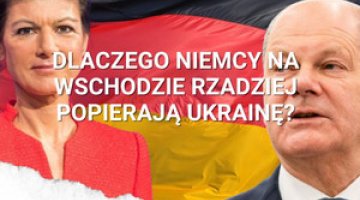Global Europe. Scholz’s speech to the European Parliament
On 9 May, German Chancellor Olaf Scholz gave a speech at the European Parliament in Strasbourg as part of the ‘This is Europe’ series of debates, in which heads of government of member states offer their views on the future of the EU. In his speech he focused on two areas: the multipolar international order and the EU’s domestic policy priorities.
According to Scholz, in the 21st century the global international order will be multipolar. The EU should therefore actively develop its cooperation with African, South American and Asian countries because of their demographic, economic and political potential. The multipolar nature of the international order requires the EU to strengthen its global weight vis-à-vis the superpowers. The Chancellor also stressed the crucial importance of the EU’s partnership with the United States. In order to maintain the high quality of this partnership, he said, it is necessary to strengthen Europe’s capabilities in the areas of security (by close cooperation with NATO, among other means), its economic potential and its technological sovereignty.
According to Scholz, the EU’s relations with China are still based on the triad of ‘partner, competitor, rival’, but the last two elements of this arrangement are gaining in importance. In this situation, the EU’s response should be based on the proposal made by EC President Ursula von der Leyen: “not decoupling, but a wise de-risking” (“Kein Decoupling, aber ein kluges Derisking lautet die Devise”). That is why it remains so important to seek partnerships with countries in Africa, South America and Asia; it will be easier to make such arrangements if the EU places a greater focus on the problems of these regions, such as food security and climate change, and signs trade agreements with MERCOSUR, Mexico and India, among others. Scholz also said that raw materials purchased in these regions should be processed locally, rather than in the PRC or elsewhere.
Scholz also referred to Russia in his speech. He declared that Europe’s response to the Kremlin’s imperialist policies should be “a prosperous, democratic, European Ukraine”. At the same time, in connection with the commemoration of the end of World War II in Moscow, he said that the Union should not feel intimidated by Russia’s policies, and that Europe should support Ukraine and stand by it for as long as it takes.
Regarding the EU’s institutional reforms, its migration policy and the need to adapt to the next industrial revolution, the Chancellor noted that the EU’s enlargement process is inextricably linked to the reforms it makes. The extension of qualified majority voting in the EU Council to the areas of foreign policy and taxation remains a key project. Scholz welcomed the proposals for institutional reform put forward by the EP, and said he would seek to have them addressed at European Council meetings. He also supported strengthening the EC’s ability to initiate proceedings whenever fundamental values are violated. He called for progress in reforming the asylum system, reiterating the ideas he put forward in a speech in August 2022, even before the EP elections: expanding cooperation with the migrants’ countries of origin and so-called transfer states, and strengthening the defence of the EU’s external borders. He also stressed the need to adapt Europe’s countries and economies to a “climate-neutral future”, which he considered the biggest task for the EU.
Commentary
- Scholz’s speech can be described as a truncated version of the Prague speech (see ‘Bez przełomu: praskie przemówienie Scholza o reformach UE’). It lacked new initiatives, and some of those that he put forward in August 2022 were not addressed in any greater detail (such as the EU’s financial policy or the proposals to reform the EP and the EC). The speech reflected the state of the debate in Germany on the future of the EU; the issue ranks behind domestic affairs, relations with the PRC, the US presidential election and the war in Ukraine. It is possible that Scholz’s message may also have been prompted by the EP elections next year, and the belief that there is too little time to push these ideas. That is probably why the Chancellor decided to stick to outlining the priorities.
- Scholz was critical of the idea of building a ‘European world power’. This may be interpreted as a German response to the French president Emmanuel Macron’s calls to position Europe as a separate power, not subjected to other actors. The Chancellor emphasised the importance of relations with the United States, stressing that any European plans to strengthen the EU’s security and economic strength will not be made in opposition to the US, which (unlike China and Russia) should clearly be seen as a partner and ally. Also telling is the speech’s omission of the European Political Community, which from Paris’s perspective was meant to be a political platform for all European countries.
- The German chancellor once again stressed the link between EU enlargement and its reforms, confirming that this is Germany’s chief project for the future of the Union. For Berlin, the extension of qualified majority voting in the EU Council to the area of EU external policy remains crucial. The implementation of this reform thus appears to be a prerequisite for the admission of new countries to the Union. In Germany’s perspective, this is intended both to enable the EU to function in its enlarged composition and to make it better prepared to take global action. So far, however, Germany has not taken steps to convince the most sceptical countries of this idea. Instead, it is developing formats for cooperation with those countries that support this postulate. This is evidenced by the establishment on 4 May of the Group of Friends to foster Qualified Majority Voting in EU Common Foreign and Security Policy by Belgium, Germany, Finland, France, Italy, Luxembourg, the Netherlands, Slovenia and Spain. Its stated goal is to ‘make progress’ in expanding majority voting in the Council of the EU, based on the regulations already contained in the EU Treaty. Membership in the group is open to all member states, and the body is expected to make the results of its work available to other EU countries. It is likely that such initiatives are geared toward forming a coalition that could push for a change in the voting formula in the EU Council after the EP elections.
- However, it is possible that Scholz’s mentions of external policy (excluding the area of security) and taxation are a way to meet the expectations of those countries which are sceptical of voting reform in the EU Council. Such a hypothesis is supported by the absence of any mention of the need for treaty reforms (as was hinted at in the Prague speech), and his use of softer rhetoric in the passage on the rule of law. It is therefore possible that Germany wants the reform negotiation process to proceed along two tracks: on the one hand, Berlin will consolidate the ranks of those in favour of extending qualified majority voting, while on the other seeking a compromise with opponents of the idea.
- Germany continues to attach great importance to relations with the countries of the Global South. This is another in a series of speeches by high-level German politicians in which the countries of Africa, South America and Asia have been assigned a high place among Germany’s foreign policy priorities. Indeed, in developing cooperation with the aforementioned regions, Berlin sees an opportunity to reduce Europe’s economic dependence on China and limit Chinese influence; hence the calls for the rapid completion of negotiations and the conclusion of free trade agreements. From Germany’s point of view, prolonging the process threatens to decrease the interest of African, South American and Asian countries in Europe’s offer, something which could weaken the EU’s position during negotiations.





